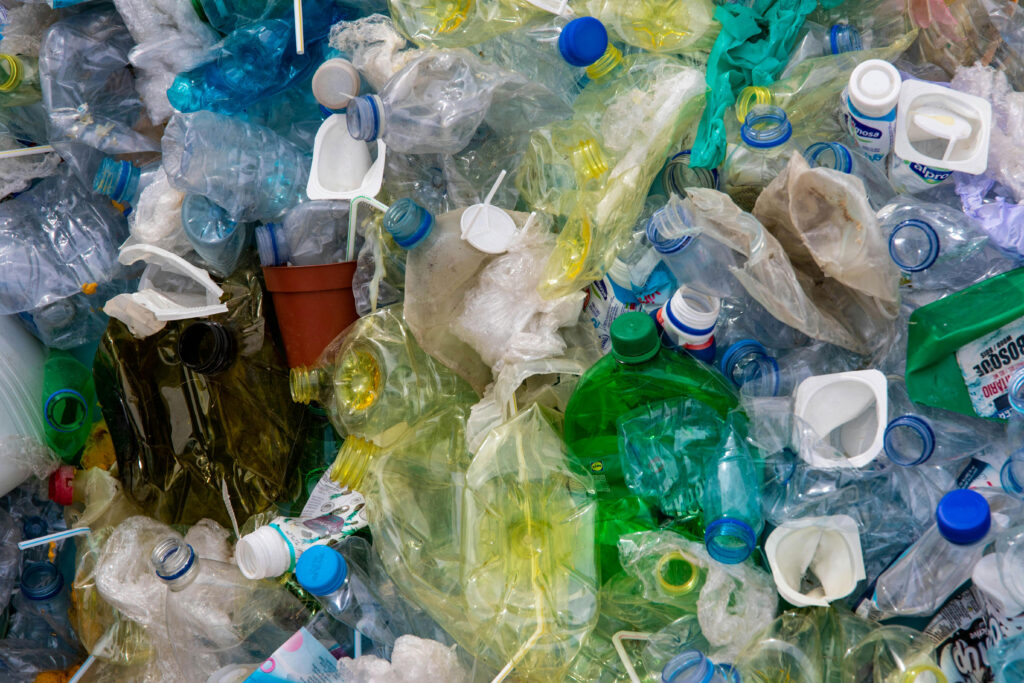Reduce plastic production by 60% by 2040

Theme of International Earth Day, April 22, 2024
We produce 430 million tonnes of plastic a year. Two thirds of these plastics are short-lived or single-use, the plastics coating our food, for example. This plastic is everywhere, around our food, in our clothes, in our cosmetics.
Every year we throw away 280 million tonnes of plastic. 46% is landfilled, 22% is dumped in nature and the rest is recycled. Plastics, in nature, take hundreds of years to decompose. They accumulate in the oceans, creating islands of plastic. Marine animals eat them and the plastic blocks the entrance to their stomachs, they end up starving.
Plastic also has a big impact on climate change. Its production is the most energy intensive. Created with crude oil, plastic generated 1.8 billion tonnes of greenhouse gas emissions, or 3.4% of global emissions.
In Switzerland, the FOEN estimates that, each year, around 14,000 tonnes of macroplastics and microplastics are released into soils, surface waters and their sediments. Most of it comes from tires and illegal dumping.
Where is plastic used?
The answer is everywhere. 36% of plastic manufactured is used as packaging, mainly for drinks and food. In agriculture, it is in plasticized seeds to mulch. Industrial fishing leaves 50 million tonnes of plastic in the ocean. 60% of the clothes produced are made of plastic: polyester acrylic and nylon.

What is microplastic?
Microplastic is a ball of less than 5mm of plastic. It can form during laundry or from car tyres. It is evacuated by rainwater and ends up in groundwater, rivers and lakes. We swallow these microplastics in our drinks and in our food.
What is single-use plastic?
Single-use plastic is, as its name suggests, plastic that is only used once. It could be a bottle of shampoo, the plastic that coats meat, a straw, a Q-Tips, picnic plates and cups, a bottle of soda and many other things.
So, what is being done about plastic?
Top 10 of the countries that have reduced their single-use plastic consumption
1. Sweden recycles and reduces single-use plastics;
2. Norway introduced a tax on single-use plastics for businesses to find a sustainable alternative;
3. Canada bans single-use plastics such as plastic bags and straws;
4. France bans single-use plastic bags and encourages the use of reusable bags;
5. UK wants to eliminate plastic waste by 2042;
6. Germany has introduced a deposit on plastic bottles;
7. Australia bans microplastic in cosmetics and personal care products;
8. Since 2017, Kenya has banned plastic bags and severely punishes those who use them;
9. India has implemented a campaign to raise awareness about waste management and recycling; and
10. Chile bans plastic bags in major cities and coastal areas.
Switzerland is in discussions with the European Union to find the best way to solve the problem.
Industries are also considering how to reduce plastic production. They are focusing on recycling existing plastic and biodegradable or sustainable packaging.
And what can we do?
1. Take a bag from home to go shopping:
2. Stop buying bottled water, tap water is very good;
3. Buy as much as possible in bulk;
4. Replace plastic containers with glass or metal;
5. Buy take-out meals from restaurants that do not use plastic as containers or bring your own;
6. Freeze your food rather than buying it packaged in plastic;
7. Avoid cosmetic products containing microplastics;
8. Buy cleaning products in cardboard boxes;
9. Choose natural sponges or microfiber pads; and
10. Recycle as much as possible.
There are many ways to reduce your consumption of single plastic: QTips with a cardboard stem, bamboo combs and toothbrushes, metal straws. You can fill your water bottle at home rather than buying another one. You can use your cup for takeaway coffee and more. If consumers refuse to buy food in single plastic, businesses will follow. If everyone does their part, Earth Day’s gaol for 2024 is achievable.
Links
Résultats 2022 : 4260 kg de déchets en moins, autour et dans le Léman !, Net’Léman
Journée internationale de la Terre : planète contre plastiques, Le Courier du Vietnam
Comprendre la pollution plastique et son impact sur les vies, Afrique Renouveau
Lutter contre la pollution plastique pour une planète plus propre, DGB Group
Combattre la pollution plastique, Guide Pratique, Journée Mondiale de l’Environnement
Plastique partout: 18 conseils malins pour réduire votre consommation de plastique, Presse Santé

Delwyn Dupuis
9, Rue du Carre
CH-1174 Montherod
Email : delwyn.dupuis@gmail.com
© 2025 All Rights Reserved.
